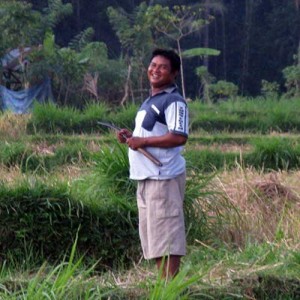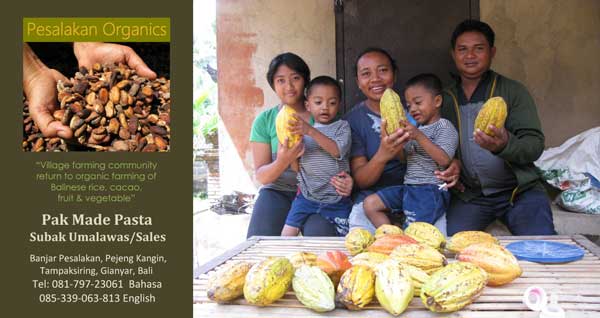Introductuction to Pak Made Pasta, your Neighbour!

Some of you might know Pasta as Ubud’s raw organic Cacao supplier, or the exterminator man who looks after those annoying pests in your hotel. For me, Pak Pasta is my neighbor and friend in our small village called Pesalakan in Pejeng Kangin, 20 minutes NE of Ubud. Over the past 10 years, I have watched Pasta and his father tend their rice fields diligently unlike the other rice farmers in the Banjar. Because of his keen interest in practicing English with me, I learned how the Subak functions as the Balinese irrigation system for cultivating rice. With monthly blessings to Goddess Dewi Sri, the rice Goddess at the Subak temple, and a well-organized schedule for the community members to jointly manage the Subak rice growing cycles, UNESCO recognized this system last June as a World Cultural Heritage Site.
“Sitting back, relaxing and just watching the rice grow has been the best part of my holiday here in the REAL Bali” wrote one of our guests, “It’s truly a healing feeling!” My favorite time is after the harvest, just before the next planting during the 1st flooding. The charcoal seared grass roots have been turned over and over by a huge metal motorized paddle wheeler that took over the slow and graceful steps of the sapi, a beautiful deer like cow or sometimes the traditional water buffalo, just two years ago in our Banjar. Luckily, you can still find this traditional scene up in the small hill village sawas nearer to Kintamani Mountain and in the Western region of Bali.
During this stage, the babek, the organic ducks of Bali, come waddling down the subak path and into the mucky fields. The ones with the crown of head feathers are called King Ducks and usually have 8-20 wives. ‘Anyone want to reincarnate as a Balinese male duck??’ Now these Pesalakan village babek are very smart, usually unaccompanied by the “Duck Man” with his guiding stick adorned with a white or red plastic bag, they find themselves in a new field every day. “Pak Pasta” I ask, “how do they know where to go each morning?” With a smirk on his face, “They can smell yesterday’s poo!!” This natural fertilizer is part of the rice cycle. The healthy organic range ducks eat the remaining cornels of loose rice, and larvae of mosquitoes and other insects lingering in the soils. Just as a side note to that… mosquitoes that hatch and fly away are consumed by the wallet, the swallow bird that spit to make their noodle basket like anti-carcinogenic nests that are full of enzymes and a high commodity with the Chinese Indonesian and Malay population. But, that’s another story of “How the Swallow Guesthouse came to be.”
After the second churn, the fields are flooded once again with the mountain waters of the Subak and the planting of young sprouts begin. In spurts of growth brought on by fertilizer and strong sunlight, the stocks of rice are tended casually for a three month growing period, or four months if the chosen crops the traditional Balinese Black rice that is used for ceremony and consumed on special occasions. ‘Thoroughly enjoy your blessed Black Rice Pudding with fresh coconut milk and savory palm syrup’, a morning favorite at the guesthouse.
Earlier this year, young Pasta was selected as the Subak Umalawas Pekaseh, leader of the Subak Social Organization that has been functioning for hundreds of years. 32 year old Pasta, father of 5 year old boy twins and a charming elder daughter, another keen English learner who I’m sure will aspire with her determination and wits, addresses the challenges brought on between elder conformed minds and the young optimistic spirit. I’m pleased to see his eagerness in moving the Banjar towards clean, sustainable organic farming practices where the farmers can sell their rice and other produce like the cacao, coconut oil, avocado and chilies to local restaurants, hotels and markets and receive a good income for their families. I’d like to think that the conversations we shared over the years have helped to give him a worldly perspective and to see how he and his Pekasah play a role in today’s densely populated tourist destination where demands for healthy living is strived for.
A few weeks ago, I asked Pak Pasta to attend the Organic Consumerism Symposium of Bali organized by IDEP at their Demonstration Organic Farm and Education Centre near the Green School, “the greenest school on earth” located south of Ubud. Well, did his keenness sparked attention. Ten days later, IDEP’s guest lecturer visited our Banjar so the community could learn firsthand about organic farming. The local elementary school kids dressed in matching brown uniforms listened wide eyed and enjoyed a laugh or two. Tampaksiring senior high school students greeted me with smiles and I learned that they are learning about ecology and natural recourses and the necessity in protecting the environment. This all sounds good. And, combined with their spiritual relationship to the five elements of life, soil, water, fire, metal and wind, we should be well on our way! But, my fingers are crossed with hope for environmental education sponsorship in the local schools, my heart is wide open, and my hand-made raw cacao balls are fueling the laborers building the cow barn. This is my effort to assist this very positive movement forward into past methods of natural cultivation and sustainable community living.
Stay tune to the next story when I learn how the Sapi’s waste in processed!

